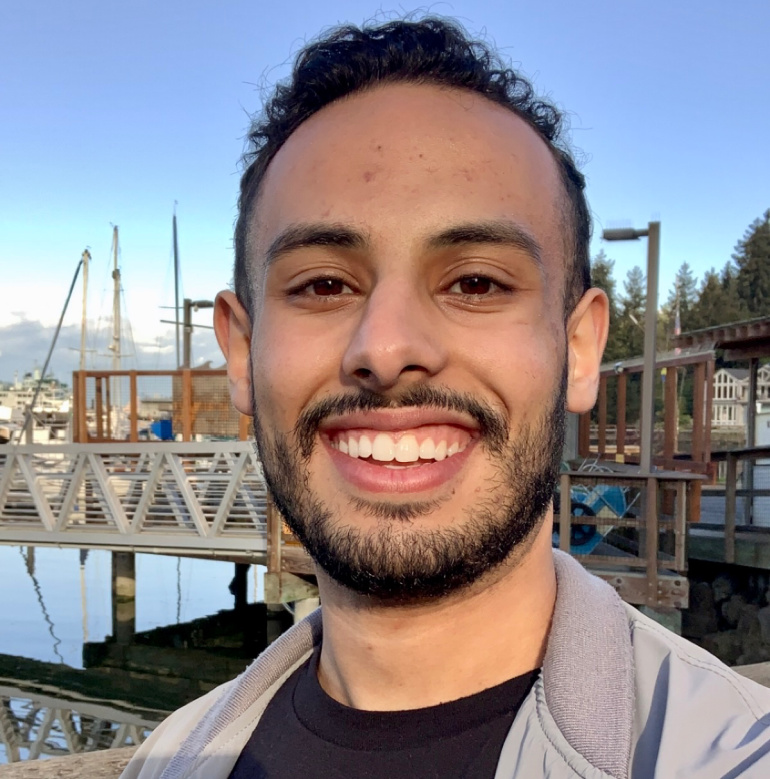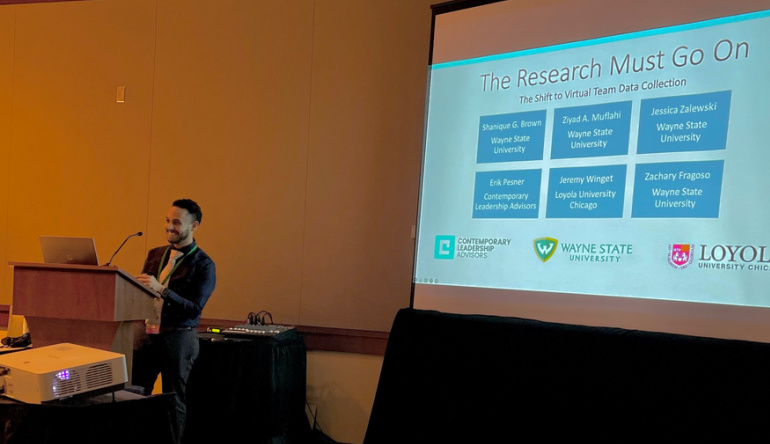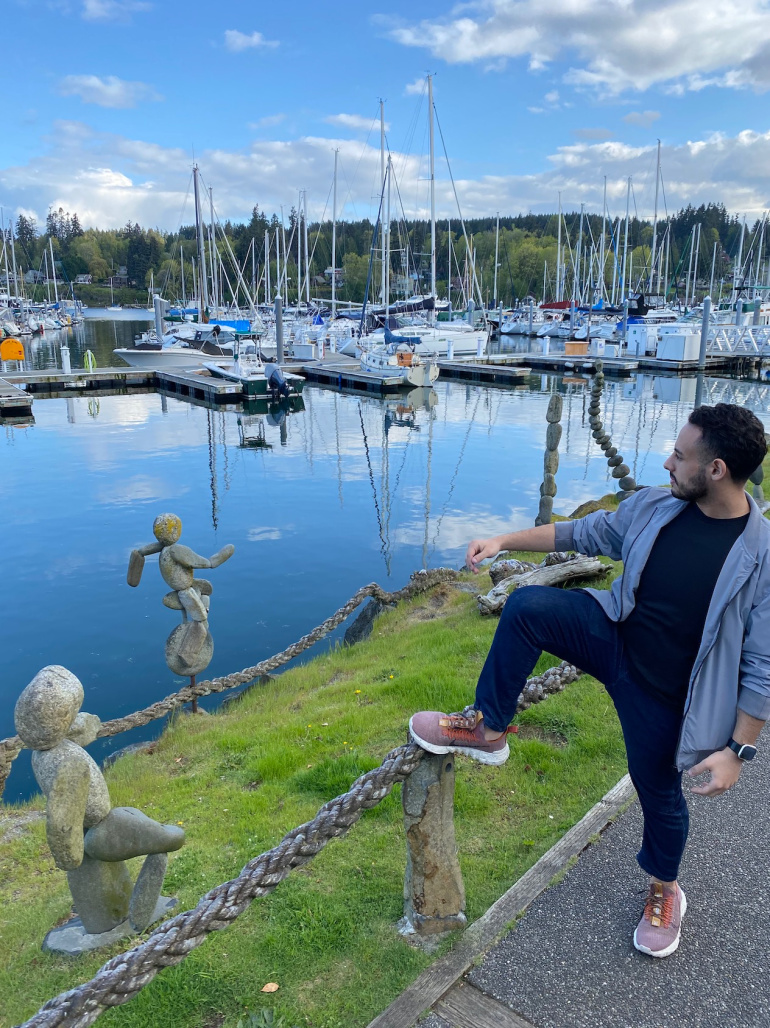
Ziyad Muflahi is enjoying his second stint at Wayne State University much more than his first.
Muflahi initially came to Wayne State as an undergraduate but struggled due to personal reasons. He was, he said, “kicked out for poor performance.”
Community college helped him turn things around academically, and he went on to earn his bachelor’s degree. Now, Muflahi is back at Wayne State — this time as a Ph.D. student studying industrial-organizational psychology.
He was recently awarded one of NASA’s Michigan Space Grant Consortium’s Graduate Fellowships for his project titled “Long-distance Space Exploration Teams and Cognitive Integration."
“If you would have told me back then I would be back at Wayne State as a Ph.D. student and working with NASA, I would have told you, ‘Go sell your lies to the next guy,’” Muflahi said with a laugh. “I originally came here straight out of high school to study biology, and then I wanted to go into some sort of medical field. At that time, our house was under foreclosure, and I had a few semesters where my GPA was pretty much zero. Wayne State encouraged me to go to a community college, demonstrate I can perform and then maybe come back.”
Muflahi earned an associate degree from Henry Ford College and said he fell in love with psychology. He earned his bachelor’s in psychology and business studies from the University of Michigan-Dearborn. When he was looking at Ph.D. programs, he felt Wayne State was a great fit.
 “When I was applying for a Ph.D. program, I was really fortunate that Wayne State kind of looked at my past and said, ‘That's okay, we would love to welcome you back,’ and they gave me a stipend to come in and study,” Muflahi said. “It’s a nationally ranked program, so I’m blessed to be here studying psychology at Wayne State.”
“When I was applying for a Ph.D. program, I was really fortunate that Wayne State kind of looked at my past and said, ‘That's okay, we would love to welcome you back,’ and they gave me a stipend to come in and study,” Muflahi said. “It’s a nationally ranked program, so I’m blessed to be here studying psychology at Wayne State.”
Muflahi will be working with Wayne State Assistant Professor of Industrial Organizational Psychology Shanique Brown on his NASA graduate fellowship.
“I’m lucky enough to be exposed to an advisor who has done work for NASA. Dr. Brown has done extensive research for NASA,” Muflahi said. “She put this on my radar. She said, ‘My research might be valued here and might align with their mission.’ That’s how I was first exposed to this.”
Muflahi admitted psychology isn’t the first thing people think of when they think of NASA, but as NASA prepares for future missions, the psychology and teamwork of the astronauts and everyone involved is crucial.
“It makes sense why NASA values this work,” Muflahi said. “I’ll be looking at hundreds of teams. The whole research topic itself revolves around efficiency. How do we make teams more efficient? And efficiency is really cool, because I don't think there's anyone in the world where if I said, ‘We can make your job easier, better and more fun to do,’ they would say, ‘No.’ The benefits of this research are really exciting.”
Brown said Muflahi’s problem-solving skills are impressive and part of what made her feel he would be a good fit for this fellowship.
“Given the plans for future long-duration space exploration (LDSE), it is important that we understand the team-related issues including collaboration, coordination and knowledge integration as crews prepare to live and work together for an extended period of time,” Brown said. “Working in our lab, Ziyad is currently involved in projects to understand the drivers of team effectiveness in traditional work teams. His experience working on these research projects, and the knowledge he is acquiring about the factors that help teams to collaborate, coordinate and integrate diverse expertise can be transferred to research about similar processes among space crews. Beyond what he can offer in terms of content knowledge about teams, Ziyad is genuinely interested in and excited about the research question he is examining, and that is necessary and important for success during the fellowship.”
 Muflahi credits Brown for preparing him for this fellowship.
Muflahi credits Brown for preparing him for this fellowship.
“She's enabled me to pursue what I want to pursue,” Muflahi said. “A lot of other advisors will kind of pigeonhole you into doing the work they're doing. Dr. Brown has allowed me to do the work that I'm passionate about. She’s also helped me see the value of my own research. She has allowed me to recognize that my research is important, showed me why it's important and made me see the value of my own work.”
Muflahi said he is the first Wayne State psychology student to receive the NASA fellowship.
“This is the first time that a recipient from Wayne State has received this award outside the traditional hard sciences,” Muflahi said. “I study psychology, which is not typically what people consider a STEM industry. So, I’m the first student from Wayne State in a non-STEM field. I was really proud of myself for that.”
Muflahi’s proud of earning the fellowship but admitted at first it was hard for him to believe.
“After reading the initial email, I just froze,” Muflahi said. “I think when I snapped back to reality I felt absolutely thrilled. I am passionate about the research I do. And I felt a sense of pride and accomplishment in knowing that NASA recognized the potential value of my work, and was willing to not only recognize the value, but then support me in pursuing it. And then, just to be frank, I felt a sense of responsibility and urgency, to make the most of this opportunity. So, I felt a ton of emotions — I was flooded with them. I’m really excited for the journey ahead."
“When I tell people I'm going to be doing work for NASA, I often see a sense of excitement and they are impressed,” Muflahi added. “People love NASA, the work they do is literally out of this world. It's a ton of cool research. I think that people are impressed that I have this opportunity.”
Muflahi’s admitted his plans after the fellowship, once he completes his Ph.D., are still up in the air. He’s just excited to see how things play out.
“My research can benefit every single company or organization,” Muflahi said. “I’m excited to get out there and leverage my research and background for organizations. I want to find an organization that values my work and my background. An organization like NASA, which values my pursuit of making work better for everyone involved.”
